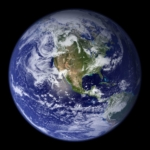Climate change can seem a very long-term issue. But that depends what you mean by ‘long-term’. Imagine, as if in some long-lost Star Trek episode, that years became seconds….
 If years were seconds, the universe would have started 435 years ago with the Big Bang. Earth would have come into being 145 years ago. And then 20 years later, the first lifeforms started twitching, the only known life among trillions of planets.
If years were seconds, the universe would have started 435 years ago with the Big Bang. Earth would have come into being 145 years ago. And then 20 years later, the first lifeforms started twitching, the only known life among trillions of planets.
In the following century, despite the world freezing over a few times, life kept evolving – cells with internal organs and then sea creatures like shrimps and crabs.
Seventeen years ago, loads of new creatures appeared in the ‘Cambrian explosion’ and then two years later, they nearly all got killed off again in the ‘Cambrian extinction’. Enough living things survived to keep evolution rolling, until eight years ago, when the Permian extinction, or ‘great dying’, killed off 90% of all species, possibly triggered by global warming.
Again, life survived. Mammals appeared, but dinosaurs ruled the Earth from six years ago until two years ago when they too were wiped out, perhaps by a comet. There is a pattern here.
 Two and a half months ago, the earliest humans split from the chimpanzee family and then went through several variations – homo erectus, homo neanderthalensis, homo this and that – until just over a day ago, homo sapiens emerged in Africa and started exploring the world. Until two and half hours ago, they were little more than wandering farmers, hunters and cave painters. Then, primitive civilizations appeared, walls, wheels – and wars.
Two and a half months ago, the earliest humans split from the chimpanzee family and then went through several variations – homo erectus, homo neanderthalensis, homo this and that – until just over a day ago, homo sapiens emerged in Africa and started exploring the world. Until two and half hours ago, they were little more than wandering farmers, hunters and cave painters. Then, primitive civilizations appeared, walls, wheels – and wars.
An hour and a half ago the early Pharaohs came along and Stonehenge was built. Buddha attained nirvana 40 minutes ago. Jesus lived 30 minutes ago. The Renaissance started 10 minutes ago and the Reformation eight minutes ago.
Then the big revolution. Four minutes ago, James Watt invented the steam turbine. A minute later, Faraday demonstrated electricity. A minute after that Benz invented the internal combustion engine. Humans found they could use fossils that had been compressed underground over millions of years as fuels to enable billions to benefit from these inventions – and create more – microwaves, laptops, the internet, smartphones.
Cities grew and populations swelled. Three minutes ago, the world’s population was one billion. One minute ago it was three billion. Now it is over seven billion and in another minute it’s expected to be 10 billion. Over the last two minutes, the world’s economy has grown 20 times. And people now live twice as long as they did before the Industrial Revolution. 
All good – except that burning all that fossil fuel means that the concentration of carbon dioxide in the air has risen in one minute to a higher level than in the previous 10 weeks of human history.
The blanket of gases around the world is getting thicker and the global temperature has gone up one degree in the last two minutes. Scientists say it could go up by anything between 4 and 8 degrees in the next 80 seconds, if nothing changes.
The world is warming 50 times as fast as it did when emerging from previous ice ages. Carbon levels are back to pre-human times and soon the whole climate system could lose its balance – with rising seas, floods, drought, disease, crop failure, mass migration – and species extinction.
To avoid this, carbon emissions need to start going down, rather than up, over the next half a minute. That means using less energy and lowering its carbon content.
 Politicians have been taking this seriously for about the last 30 seconds and one second ago in Paris they said they wanted to keep the temperature rise to 2 degrees, 1.5 if possible. But their pledges are not enough. Experts say the 2 degree level will be reached in another 35 seconds. They now have 10 seconds to launch the measures that will stop the temperature levels hitting the danger zone. It’s doable, but a big ask.
Politicians have been taking this seriously for about the last 30 seconds and one second ago in Paris they said they wanted to keep the temperature rise to 2 degrees, 1.5 if possible. But their pledges are not enough. Experts say the 2 degree level will be reached in another 35 seconds. They now have 10 seconds to launch the measures that will stop the temperature levels hitting the danger zone. It’s doable, but a big ask.
And if they don’t … well, humans may well survive, even if they take a battering. If not, they will have had their day in the sun. It will have been less than a thousandth of what the dinosaurs managed – but it will have been spectacular. Live fast, die young. The James Deanian extinction.
And will Planet Earth worry? Maybe not. Life here has survived through five mass extinctions and it can probably survive another one. Life will go on, but, as Mr Spock observed, not as we know it.